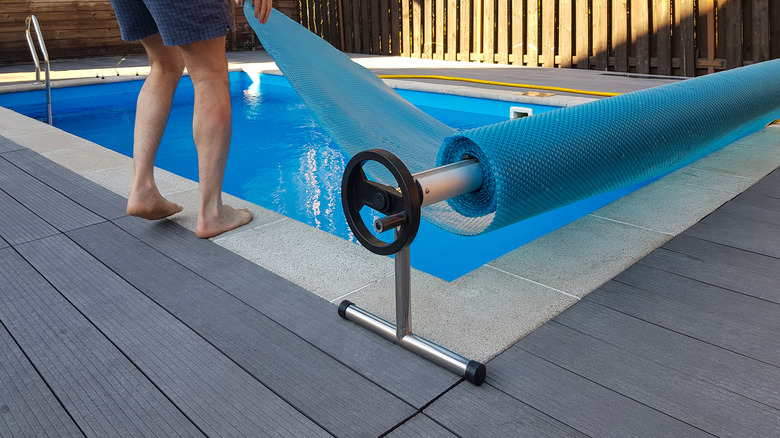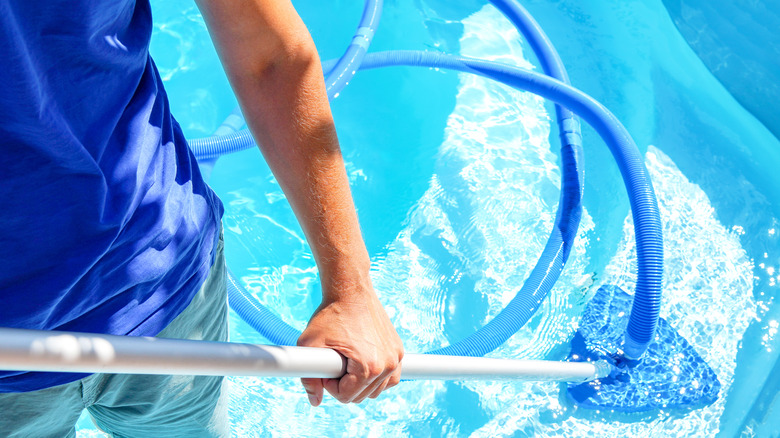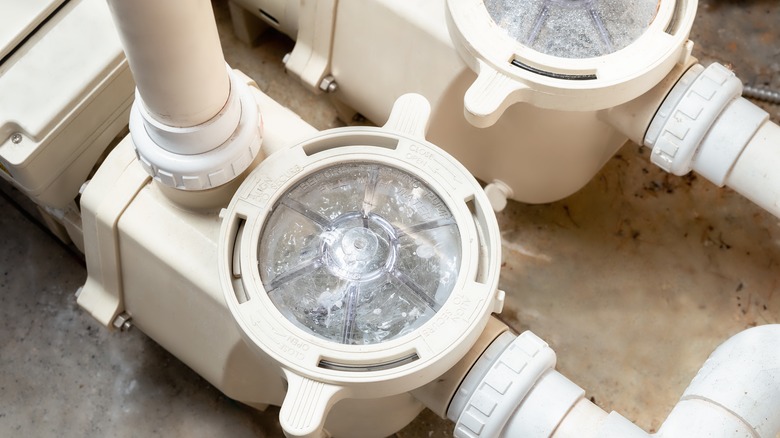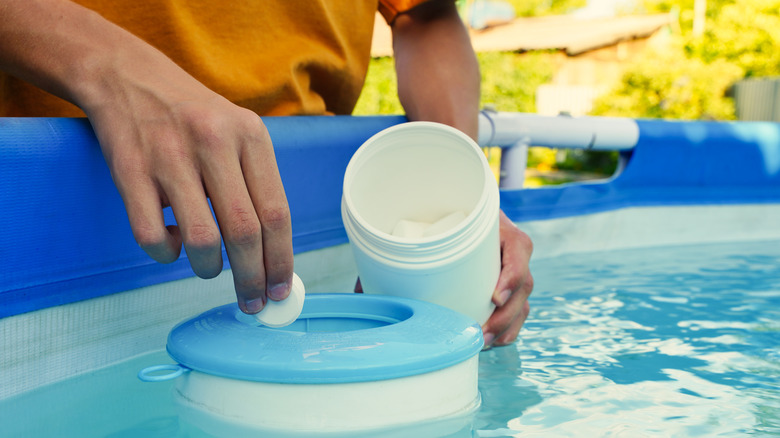5 Reasons Why Covering Your Pool Is Worth The Hassle
Covering your pool may seem like a task that isn't very important. A pool cover can be large and heavy, leading a homeowner to lug around a bulky object each time they want to place it over the pool for protection purposes. In warmer climates, a pool cover might seem like an addition that isn't strictly necessary. Homeowners in Florida or Arizona, for instance (especially retirees who have moved south from colder regions to these two states ranking among the hottest in the U.S., via Current Trends), might overlook the functional qualities of a pool cover because of the persistent warm weather that tends to prevail throughout most of the year.
A cover of any sort is a great option for retaining heat in the pool's water volume but this isn't the only reason to use one. In fact, pool covers provide a raft of important benefits to homeowners. It may be tempting to overlook the value that this feature provides, but taking the time to cover your pool can make a huge difference in the maintenance routine and overall enjoyment that you get from this backyard feature.
A pool cover maintains a hotter equilibrium temperature
First of all, a pool cover does a fantastic job of maintaining an equilibrium temperature in the water. In The Swim reports that a pool without any covering will naturally maintain an equilibrium temperature of up to 15 degrees Fahrenheit cooler than a pool sporting a covering. This can mean the difference between swimming in the late fall or even winter months and packing away the pool equipment for an extended period of the year as the weather turns with the seasons.
Pool covers create a pocket of air between the surface of the water and the cover itself. This air pocket is heated significantly by the sun's rays as they strike the plastic, vinyl, or polyethylene surface of the cover. The solid construction of a pool cover combines with this unique air pocket to form a barrier that prevents evaporation from happening as the sun heats the surface of the water, and it transfers heat directly down into this liquid body throughout the day. Pool covers designed to increase solar heating don't have to be outrageously expensive or difficult to maneuver. Solar covering is perhaps the simplest version of a full cover, and it's one that any homeowner can use to great effect.
They reduce maintenance needs
In addition to the natural heating feature that standard pool covers provide, a simple covering can also reduce routine maintenance requirements of this backyard water feature by a substantial margin. Homeowners who enjoy the addition of a pool in their backyard love the relaxation that it brings to bear, but they also know the amount of work it takes to maintain. In order to combat algae bloom, homeowners often find that they need to sweep the pool once a week and perhaps even more often (twice is recommended by professionals, via Challenger Pools). In addition, leaves, insects, and other debris quickly pile up at the bottom of a pool that hasn't been vacuumed in a few days. Sweeping and vacuuming are natural steps in the preservation of a comforting and relaxing pool environment. But chemical usage and filtration requirements also play a major role in the upkeep of a high-quality home pool.
Homeowners with pools are often found testing the pH level of the water and adding required chlorine and other chemical elements to ensure balanced water chemistry that is both acidic enough to kill off germs and bacteria yet base enough not to harm the eyes and skin of swimmers. With the pool cover, these foreign elements aren't able to gain a footing in the water of your pool quite as easily. This means that you can spend more time relaxing and less time worrying about the pool's health.
A cover will extend the lifespan of your filtration system
In the same way that a homeowner who uses a pool cover won't have to sweep or vacuum their pool as often, this feature can also cut down on the pressure that routine cleaning puts on your pool's filtration system. Your pool pump works hard to move water through a filter in order to remove dirt, leaves, and other debris from the water (via Anchor Pumps). Cleaning out the filter is a common job for pool owners, and in the worst affected areas, an increase in replacement occurrences may be seen. The more gunk that flows through your filter, the less effective it will become over time. This is a natural consequence of any filtration process.
By using a pool cover, you will drastically reduce the amount of debris that enters the pool to begin with. This means that not only will you enjoy a reduced need to vacuum and sweep the surface under the water, but your filter also won't encounter nearly as much debris and resistance as you circulate the water to reduce instances of algae growth. Not only does the use of a full cover help free up more of your time that would otherwise go to pool maintenance, but it can also reduce your overall cost of ownership by extending the life of your filtration and pump units too.
Pool covers dramatically cut down on chemical requirements
Chlorine is the most well-known pool chemical that homeowners rely on to maintain a safe and beautiful-looking water feature. But intelligent use of this chemical is a must when protecting the clear water of your pool. For instance, pool owners know that shocking the pool in the morning is always a bad idea (via Solda Pools). As the sun strikes the surface of your pool throughout the day, a recently chlorinated pool will experience a heightened level of evaporation that brings aerosolized chlorine up out of the liquid solution as well. In the same way that a layperson would understand chlorine to be the quintessential pool chemical, they also know chlorine gas to be a highly volatile toxin that came to fame during the first World War more than a century ago (via Science History). Today, chlorine gas is a universally banned weapon of mass destruction.
Responsible use of chlorine for the pool doesn't result in poisoning, but it's still worthwhile to keep its use at a minimum. Homeowners who incorporate a pool cover are able to use far less chlorine and other chemicals to maintain the quality of their pool chemistry. The U.S. Department of Energy reports that a pool cover can cut down the required chemical use by 35% to 60%, a significant margin to be sure. Not only does this save you money but it also maintains a safer environment for you and your loved ones.
They can act as a safety feature, too
Lastly, a pool cover can offer itself as a safety feature that may prevent injury or even save lives in the most extreme of circumstances. A simple solar cover won't prevent a person from falling through the surface and into the water below, but a harder polyurethane or dense plastic covering can bear the weight of a child, and in some cases, an adult. Homeowners can also make use of pool coverings designed specifically to turn the pool surface into a walking area. Some covers are rated to hold a weight of over 400 pounds (via Poolsafe) and can be used to extend the functional gathering space outside your home during the winter.
Even though homeowners know the value of safety features around the pool, it's often easy to fall victim to the idea that a pool-related accident couldn't happen to you. Still, the CDC reports that over 8,000 unintentional drownings occur every year, with almost half of them resulting in death. Pool owners simply can't be vigilant enough when it comes to safety measures around their pools. A split second can be the difference between daily life and immense tragedy. Therefore, the use of a high-density pool cover to add a critical safety feature to your backyard is a great option that all homeowners should consider.





